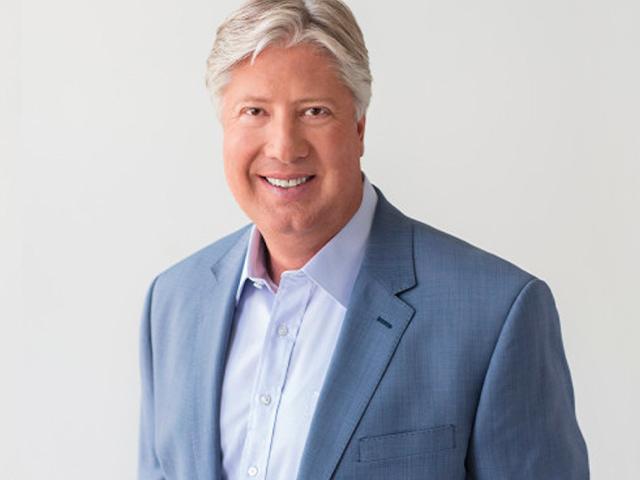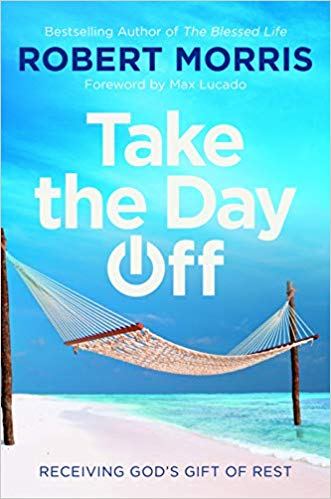Author Robert Morris Urges You to ‘Take the Day Off’
As the founding senior pastor of Gateway Church in Dallas, Texas, Robert Morris ministers to more than 71,000 active attendees each week. Needless to say, his life is filled with the many demands that are placed upon him as the leader of one of America’s largest congregations. Realistically, it would be quite easy for Morris to eliminate the off switch in his life so that he could maximize every moment of the day.
Pastor Morris’ situation is not uncommon. We are living in a society of chronically under-rested people, one that demands that we be ready and available at all times regardless of the day or hour. The end result is living a life filled with constant worry, fear, and yes, I’m going to say it … regret. Regret that we didn’t take time for ourselves to rest.
In his latest book, Take the Day Off: Receiving God's Gift of Rest, Morris demonstrates how to honor the Fourth Commandment by taking a mandatory day of rest to refuel ourselves emotionally, spiritually, physically, and mentally. It his contention that doing so will allow people to relax without guilt.
I recently spoke to Pastor Morris about why people struggle to observe a Sabbath, what they should “not do” when taking a day of rest, and how an empty sock drawer contributed to him writing Take the Day Off.
Simple question to start, why are people so tired and need rest so much these days? What is so different than even 20 years ago?
I think what's different today is that 20 years ago, 40 years ago, 80 or a 100 years ago, it was normal for people to rest one day a week. I think we've got a culture now with technology where we actually just carry our work around everywhere we go. We all used to have a work phone and a home phone. Now we carry our work phones with us in our pocket all the time and we carry our work email with us all the time. I think it's very difficult to take a day off in the society in which we live. But I think that's a principle that will reap tremendous benefits in our lives if we do it.
If rest is so important, then why aren’t people more concerned about it? Why is our lack of rest “the great silent epidemic” of our time?
I think more people aren't concerned about it because they just don't realize what a detriment it's actually doing to them. I write in the book that we all have four tanks. There is a physical tank, a spiritual tank, a mental tank and emotional tank. They are holders of where I am at in those areas. I've got to have so much emotion for my family to be able to be emotionally involved in their lives. I've got to be able to think mentally when my kids are talking to me about something that they need for school that day or my wife is talking to me about something. I've got to have that mental capacity, emotional capacity, and the physical strength for meetings at work. I just think what we're doing is we are running on empty tanks. How do you fill your tank up? Think about one of these tanker trucks that goes around to gas stations and fills them up. The tanker truck then goes back to the refinery and he fills himself up. He fills his own truck up. I think the problem is that when you fill your own trucks up, you're just sitting around doing nothing. We don't like to do that. We feel like we should just keep on driving but eventually we're just driving on fumes. I think it's a huge epidemic because we don't realize how disastrous the results are without resting.
Can you share how an empty sock drawer contributed to you writing Take the Day Off?
Yes. I actually call it the Great Underwear Crisis of 2004. I had been going and going for weeks and weeks without a day off. I had just returned from an overseas trip, so my time clock was off as well. I had to get to the office. I took my shower and opened the underwear drawer and discovered I only had one pair left. And I could feel myself tearing up. Emotionally, I was so sad and in my mind I was so drained. I couldn't think straight. What am I going to do tomorrow? I couldn’t think about easy solutions like doing a wash or going to Walmart to buy six pairs. I couldn't even think that way. And when I opened my sock drawer, I had no socks. I literally started crying. I said to a friend of mine that day, ‘I think I'm losing my mind.’ And he said, ‘You're not losing your mind, Robert. You're just tired. Anyone would be tired with the schedule you've had.’ And that's when as I prayed about it the Lord showed me, you're violating the Fourth Commandment.
Here's something that will shock you coming from a pastor. I went back and read the Fourth Commandment over and over again. It actually doesn't say anything about going to church. And I do believe in church attendance, but the whole point of it is to rest one day a week. I see these commandments as principals all through Scripture as well. The whole of Scripture represents these as principles to live by, to have a better relationship with God, and a better relationship with each other. It's the only one that we think we can violate. We would never think about lying, stealing, murdering someone, or committing adultery. We know as Christians that those things are not healthy for us. And yet for some reason we feel like we can work seven days a week and not see negative consequences in our lives.
Why do you think that is? Why do you think people struggle with honoring that Fourth Commandment?
In my case, I thought I was doing it. I thought I was going to church and that's what it was. For some reason I had in my mind that we remember the Sabbath day to keep it holy. What it really says is remember the Sabbath rest, to keep it holy or set apart. I thought I was honoring the Fourth Commandment because I was going to church. And what I realized was it wasn't about going to church, even though we should go to church. It was about resting one day a week out of seven. It might not be Sunday or Saturday like it is for the Jewish people. It might be another day because we have services on Saturday and Sunday. For me, my Sabbath is on Monday.
Assuming we do observe and take a Sabbath rest, what should people do and stop doing on this day?
That is a great point. You actually have asked the question in a great way because most people ask me, what do you do on your day off? Jokingly, I'd like to say that's the wrong question. The question is not what do I do? The question is what do I not do? And what I don't do is anything that relates to my work. If I'm answering emails from work, I don't do that. If I'm studying for messages or presentations like somebody would do at work, I don’t do that. God said, ‘Six days, you shall work and do all your labor. All the work that you do, do that in six days. One day, every week I want you to rest your body. I want you to rest your mind. I want you to rest your emotions because we get emotionally involved in it. I want you to rest your spirit.’ Just pick a day and rest. And so, the most important question is what do we stop doing? And that is anything that is related to our work.
In your book you write, “We’re more effective and efficient at everything we do the other six days each week when we rest.” That is sort of the Chic-fil-a approach. Can you explain this statement?
I think if I rest one day a week instead of working seven days a week, my mind is much more refreshed. It's more alert. It's more active. I think I get more creative ideas. I'm actually more in tune to what's going on and I'm able to do better. I become a better husband and a father because my children and spouse are sharing stuff with me. I'm focused. I'm not so tired that I can't really listen and understand. We are just much more effective if we have a continual culture of rest in our life. Think about this. He put it in His top ten list.
He wanted us to observe that He put rest alongside not killing someone and committing adultery. It's pretty important to God.
I'm sure you did a great deal of research in writing this book on rest and the Sabbath. In your research, did you find anything that really surprised you about what the Bible has to say about rest?
What really surprised me was that this concept comes from a Judeo and Jewish background. Many cultures didn't have this background. One of the things that really surprised me was, in Japan, there was a guy that they found dead at his workstation. He had been a perfect employee, but he had worked an average of 110 hours a week, which is almost 16 hours a day, seven days a week. But here's the shocking thing. When they found him dead, he was just 34 years old. The Japanese have even come up with a word now to describe the phenomenon of working yourself to death. And now, the Chinese and the Koreans have a word for it. From the ancient culture, they've had to develop a word for this phenomenon because it's happening to people more and more. This is a worldwide epidemic. Obviously, God knows everything. He knew about it and said to His people, ‘You've got to rest one day a week, or your body just can't keep going.’
As the author of this book, if you could pick one piece of advice that you would give to people in regard to their lives and getting rest, what do you think that would be?
I would say be just as disciplined about this as you are about being faithful to your spouse, or being an honest person, or not having idols, or taking God's name in vain, or any of the other Ten Commandments. Be just as disciplined in this area. Let people know, ‘Hey, I believe in resting one day a week. It's not that your email's not important. I just want you to know that this is my day off.’ For many people it could be Saturday or Sunday if they work Monday through Friday. Just let people know if you email me over the weekend, you’re not going to hear back from me until Monday.
Most people will respect boundaries and understand that there's a healthy reason for it. Many people might even ask why you do this? They will see the benefit in their lives as well. My greatest piece of advice would be if you'll be disciplined about it, you'll be grateful that you put this discipline in your life.







